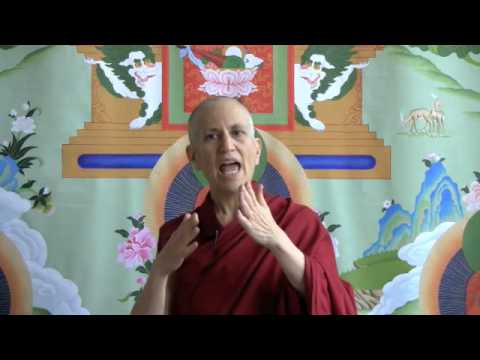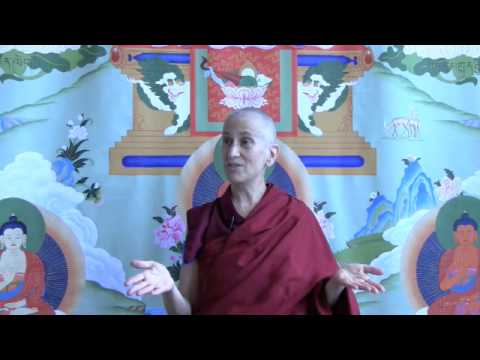Independent and dependent existence
Independent and dependent existence
Part of a series of Bodhisattva’s Breakfast Corner talks given during the Green Tara Winter Retreat from December 2009 to March 2010.
- Clarifying the difference between the meaning of independent and dependent existence
- Explaining the difference between permanent and eternal phenomena
Green Tara Retreat 18c: Independent and dependent, permanent and eternal clarified. (download)
To review, if something is independently existent, that means it cannot be dependent. Now we know things are dependently existent, they exist on causes and conditions, they exist depending on their parts, they exist on our conceiving and labeling them. Therefore, being dependent they are not independent. Independent and inherently existent are synonymous. So if they are independent, then they are also inherently existent. If they are not independent, then they are not inherently existent.
Impermanence
Somebody else asked: “I mentioned that the wisdom realizing emptiness is impermanent.”
Now, impermanent: remember it just means changing moment by moment. Impermanent things: it doesn’t mean that they’re eternal and they last forever, and it doesn’t mean that they don’t exist at all. Let’s go at this other way so I don’t get it confused. Impermanent means changing by moment by moment; permanent means something that doesn’t change moment by moment. In normal English permanent means it lasts forever and it never stops and that is also synonymous with eternal. We usually think of impermanent meaning it just comes and goes kind of like a gross impermanence. For example, the cup breaks. In Buddhist language impermanent isn’t like that. Impermanent is moment-by-moment change, and there is also the gross impermanence of things breaking or people dying, things like that. Permanent just means as long as something exists it doesn’t change moment by moment, but it doesn’t mean that things are eternal.
So this person says: “Does this mean that the wisdom realizing emptiness is impermanent, as in changing moment by moment?”
Yes, because the wisdom realizing emptiness is a conventional truth. It’s something that depends on causes and conditions. You don’t have that wisdom coming out of the blue; you have to create the cause and bring the conditions together. So something that arises due to causes and conditions, changes moment by moment, it’s impermanent.
Even in the mind of somebody who realizes emptiness, it doesn’t mean that that wisdom is constantly manifest in their mind, okay? If someone realizes emptiness, let’s say inferentially, it doesn’t mean that every single moment thereafter for the rest of their existence, the inference realizing emptiness is manifest in their mind. It doesn’t mean that. They’re brushing their teeth, they’re thinking about paying their taxes—that inference is not the foremost thing manifest in their mind. Even if somebody realizes emptiness directly, it doesn’t mean that that wisdom is manifest in their mind forever after because they also arise from their meditation on emptiness and they’re brushing their teeth, and they’re thinking about what they have to do today, and the laundry, and things like that. So that wisdom directly realizing emptiness—which only perceives emptiness—isn’t manifest in their mind when they’re doing all these other things, when they’re using their senses, okay? So you can see that that wisdom is impermanent. But once somebody has realized emptiness directly, they’re never going to lose that realization completely and backtrack to never having it again.
Eternal and impermanent
[The question continues:] “So would it be correct to say that the wisdom mind of a Buddha is eternal because the Buddha cannot fall back into ignorance?”
Yes, that’s true. The Buddha’s mind is eternal, once you are a Buddha there’s never any cause for ignorance to re-arise in you again. Because it’s been eliminated there’s no cause for it to come. So once you’re a Buddha, you are eternally a Buddha. And a Buddha, if you get enlightened in this life, when you die you don’t go out of existence, you still remain as a Buddha. You still have five aggregates but they’re purified aggregates, they’re subtle aggregates. But the Buddha’s wisdom is also impermanent because it’s not static and it’s changing moment by moment—yes! Remember, a Buddha’s wisdom perceives all phenomena. Phenomena are changing moment by moment. So that mind that perceives them must be changing moment by moment. And also, anything that’s a mind arises due to causes and conditions, so it’s got to be impermanent. Okay? Good.
Audience: The example that you gave of like an arya being, who arises from meditative equipoise, sounds to me more like an example of the wisdom mind perceiving emptiness as being eternal rather than being impermanent. Because it seems like when they arise from meditative equipoise, they know that the wisdom mind is no longer there.
VTC: It’s no longer manifest.
Audience: It’s no longer manifest. So to me it would seem more like it’s an example of it being eternal and going out of existence, and it can be back into existence when they sit back down in meditative equipoise.
VTC: Actually it doesn’t go out of existence; it goes into a seed form, the form of the seed. Then from that seed form it’s going to come again. It will arise in manifest form. It’s like our anger when we have anger in our mind. When we’re not angry the anger’s in the form of a seed. A seed is not a consciousness; a seed is one of those abstract composites. Remember those guys? Remember those three kinds of impermanent phenomena—form, consciousness, and abstract composites? So a seed is an abstract composite.
Venerable Thubten Chodron
Venerable Chodron emphasizes the practical application of Buddha’s teachings in our daily lives and is especially skilled at explaining them in ways easily understood and practiced by Westerners. She is well known for her warm, humorous, and lucid teachings. She was ordained as a Buddhist nun in 1977 by Kyabje Ling Rinpoche in Dharamsala, India, and in 1986 she received bhikshuni (full) ordination in Taiwan. Read her full bio.


